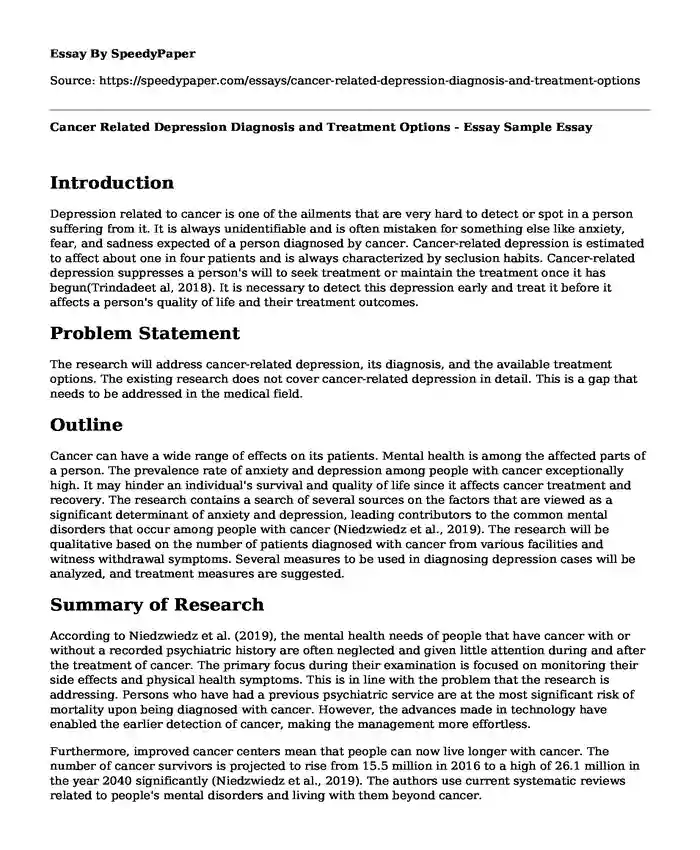
| Type of paper: | Essay |
| Categories: | Health and Social Care Cancer Healthcare |
| Pages: | 3 |
| Wordcount: | 679 words |
Introduction
Depression related to cancer is one of the ailments that are very hard to detect or spot in a person suffering from it. It is always unidentifiable and is often mistaken for something else like anxiety, fear, and sadness expected of a person diagnosed by cancer. Cancer-related depression is estimated to affect about one in four patients and is always characterized by seclusion habits. Cancer-related depression suppresses a person's will to seek treatment or maintain the treatment once it has begun(Trindadeet al, 2018). It is necessary to detect this depression early and treat it before it affects a person's quality of life and their treatment outcomes.
Problem Statement
The research will address cancer-related depression, its diagnosis, and the available treatment options. The existing research does not cover cancer-related depression in detail. This is a gap that needs to be addressed in the medical field.
Outline
Cancer can have a wide range of effects on its patients. Mental health is among the affected parts of a person. The prevalence rate of anxiety and depression among people with cancer exceptionally high. It may hinder an individual's survival and quality of life since it affects cancer treatment and recovery. The research contains a search of several sources on the factors that are viewed as a significant determinant of anxiety and depression, leading contributors to the common mental disorders that occur among people with cancer (Niedzwiedz et al., 2019). The research will be qualitative based on the number of patients diagnosed with cancer from various facilities and witness withdrawal symptoms. Several measures to be used in diagnosing depression cases will be analyzed, and treatment measures are suggested.
Summary of Research
According to Niedzwiedz et al. (2019), the mental health needs of people that have cancer with or without a recorded psychiatric history are often neglected and given little attention during and after the treatment of cancer. The primary focus during their examination is focused on monitoring their side effects and physical health symptoms. This is in line with the problem that the research is addressing. Persons who have had a previous psychiatric service are at the most significant risk of mortality upon being diagnosed with cancer. However, the advances made in technology have enabled the earlier detection of cancer, making the management more effortless.
Furthermore, improved cancer centers mean that people can now live longer with cancer. The number of cancer survivors is projected to rise from 15.5 million in 2016 to a high of 26.1 million in the year 2040 significantly (Niedzwiedz et al., 2019). The authors use current systematic reviews related to people's mental disorders and living with them beyond cancer.
The cancer patients that suffer from various types of cancer require assistance to go beyond treatment. Trindade et al. (2018) highlight that about 50% of the patients diagnosed with breast cancer often report extreme depression and anxiety levels, with 20% depicted as a significant depressive episode. Social support can be determined as the most significant factor in the general population's overall health and well-being since it concentrates on ensuring that people are well mentally. Social support can be summarized as the network of friends that someone has, which can be used to diagnose and treat cancer-related depression. When someone presumes that their friend is with them in their cancer journey, providing adequate emotional support becomes easier to push on.
Conclusion
Cancer-related depression is a severe problem that needs researchers' attention for it to be adequately addressed. There are preliminary studies done on the detection and treatment of cancer-related depression. The study aims to fill the available gap in the literature about cancer-related depression.
References
Niedzwiedz, C. L., Knifton, L., Robb, K. A., Katikireddi, S. V., & Smith, D. J. (2019). Depression and anxiety among people living with and beyond cancer: a growing clinical and research priority. BMC Cancer, 19(1), 1-8.https://bmccancer.biomedcentral.com/articles/10.1186/s12885-019-6181-4
Trindade, I. A., Ferreira, C., Borrego, M., Ponte, A., Carvalho, C., & Pinto-Gouveia, J. (2018). Going beyond social support: Fear of receiving compassion from others predicts depressive symptoms in breast cancer patients. Journal of psychosocial oncology, 36(4), 520-528.https://estudogeral.uc.pt/bitstream/10316/47986/1/ f
Cite this page
Cancer Related Depression Diagnosis and Treatment Options - Essay Sample. (2023, Dec 16). Retrieved from https://speedypaper.com/essays/cancer-related-depression-diagnosis-and-treatment-options
Request Removal
If you are the original author of this essay and no longer wish to have it published on the SpeedyPaper website, please click below to request its removal:
- Free Essay Answering Whether Fast Food Industry Responsible for Obesity
- Free Essay Dedicated to Changing Eating Habits
- Paper Example - Quality of Care and Patient Safety
- Gaining Practicum Experience in Health Informatics: Essay Sample
- Free Paper Sample on Nursing Informatics
- Free Essay Sample on Safety Net Services
- Essay Example on My Reasons for Pursuing Clinical Psychology
Popular categories




